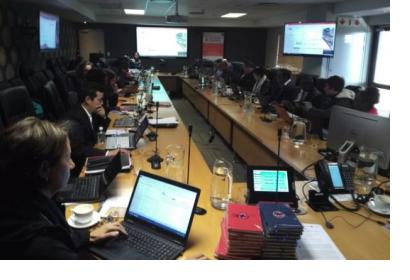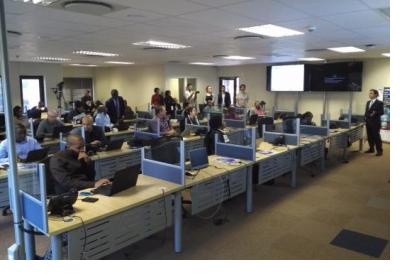Experts from the United Nations Platform for Space-based Information for Disaster Management and Emergency Response (UN-SPIDER), the United Nations University Institute for Environment and Human Security (UNU-EHS), the Centre for Remote Sensing of Land Surfaces (ZFL) of the University of Bonn and the Disaster Management Training and Education Centre for Africa (DiMTEC) at the University of the Free State (UFS) South Africa have met in South Africa as part of their joint project “Earth-observation-based Information Products for Drought Risk on a National Basis” (EvIDENz). The workshop, which takes place 4 to 8 June, brings together stakeholders, key decision makers, operational technical audiences from the rural development and agricultural sectors, space agencies, research and technology entities as well as members of water, sanitation, economic and disaster management communities.
The aim of the EvIDENz stakeholder workshop is to make decision makers and technical staff from various institutions in South Africa aware of the workflow developed by ZFL and UNU-EHS and how this workflow can be used to understand drought risk and to estimate the impact of droughts on crops and livestock. In addition, the workshop will discuss a methodological approach on the implementation of the workflow, with a training session being held to educate technical staff on the workflows as presented in the UN-SPIDER Knowledge Portal.
The stakeholder workshop in South Africa will include segments in Pretoria and Eastern Cape. The sessions in Pretoria will allow participants from national government agencies to examine the types of information that can be obtained from the workflow and will also include a dedicated training segment for technical participants. The segment in Eastern Cape will target local government officials and stakeholders and as in the case of Pretoria, it will allow participants to explore the workflow.
Through technical presentations and subsequent discussions, the stakeholder workshop will explore ways to incorporate the use of the workflow by the local government in Eastern Cape and the national government in Pretoria, in order to generate relevant information to be included in the report on progress achieved in the implementation of the Sendai Framework. The workshop will also gather feedback from decision-makers and from technical staff with regard to refinements of the methodological approach and to be integrated into the final version of the recommended practices.
The EvIDENz project develops and tests new Earth-observation-based methods to monitor drought hazard characteristics. It is carried out by the Centre for Remote Sensing of Land Surfaces (ZFL), University of Bonn, the United Nations University Institute for Environment and Human Security (UNU-EHS) and the United Nations Office for Outer Space Affairs (UNOOSA) through its Platform for Space-based Information for Disaster Management and Emergency Response (UN-SPIDER) together with partner organizations in South Africa and Ukraine.


